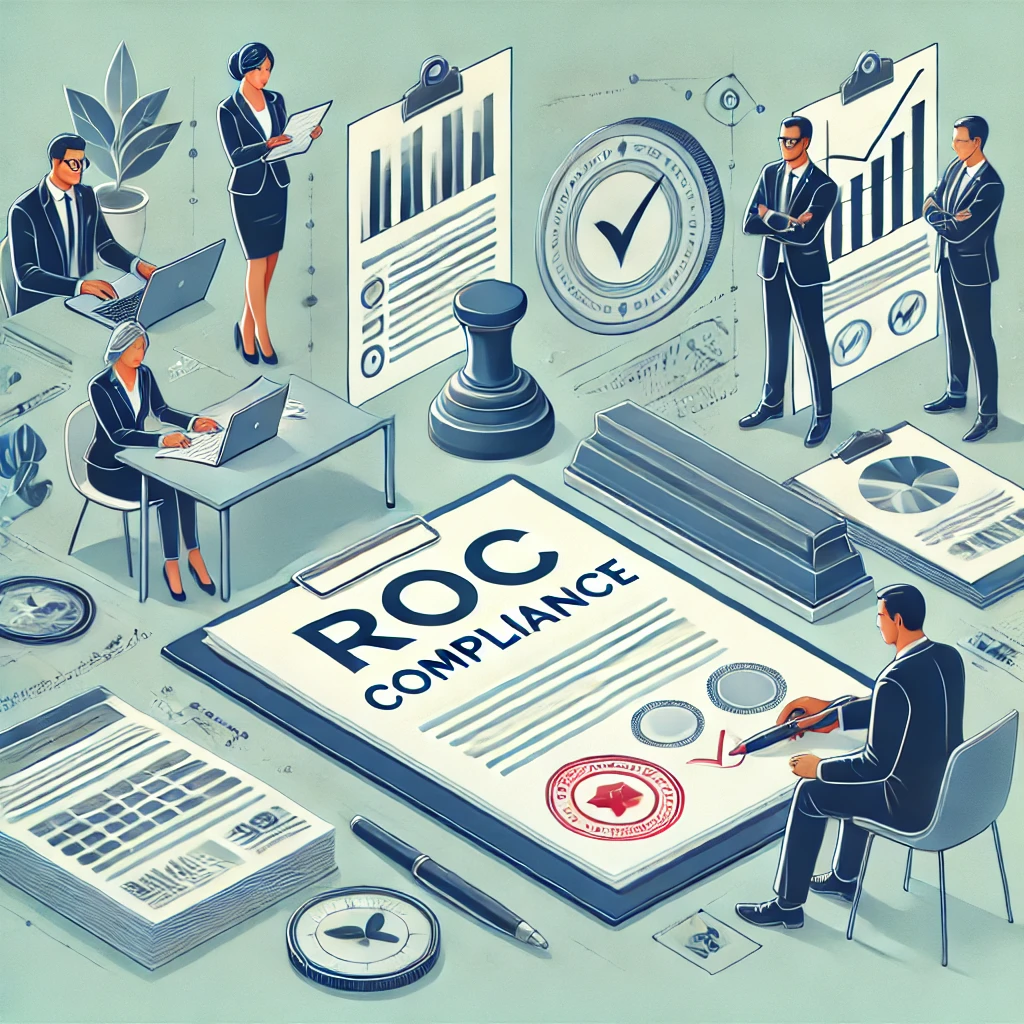Start Business
Start Business
Registration & License
Registration & License
Trademark Filing
Trademark Filing
Goods & Service Tax
Goods & Service Tax
Income Tax
Income Tax
MCA Services
Tender Registration
Tender Registration
Others
ROC Filing Consultant | Expert ROC Compliance Services Online
Best & Reasonable Plans
Smart solutions,fair prices - your success starts with the Innovative solutions, competitive pricing – your journey to success begins with the perfect balance for growth!

OVERVIEW
ROC (Registrar of Companies) Compliance refers to the legal requirements that companies in India must fulfill to stay compliant with the Ministry of Corporate Affairs (MCA). Every company registered under the Companies Act, 2013, whether private limited, public limited, or LLP, must file periodic returns, financial statements, and other necessary documents with the ROC. These filings help ensure transparency, protect stakeholders' interests, and maintain regulatory discipline. Non-compliance can lead to penalties, legal consequences, and even the disqualification of directors. Proper ROC compliance safeguards a company’s legal standing and credibility in the business world.
Key Features of of ROC Compliance
- • Mandatory Annual Filings : Companies must file annual returns (MGT-7) and financial statements (AOC-4) with the ROC to report their financial health and operational activities.
- • Regulatory Adherence : Ensures businesses follow all statutory requirements under the Companies Act, including director disclosures, board resolutions, and shareholding details.
- • Avoidance of Penalties & Legal Consequences : Regular and accurate ROC filings prevent hefty fines, legal actions, and restrictions on business operations, ensuring smooth and uninterrupted business functioning.
Who Needs ROC Compliance?
ROC (Registrar of Companies) compliance is a legal requirement for all registered companies and LLPs (Limited Liability Partnerships) operating in India. Every entity registered under the Companies Act, 2013, whether a private limited company, public limited company, one-person company (OPC), or LLP, must follow ROC regulations to remain in good standing with the Ministry of Corporate Affairs (MCA). These regulations ensure that businesses operate within the legal framework, maintain proper financial records, and report their activities to regulatory authorities.
Startups and newly registered companies also need to comply with ROC regulations from the moment they are incorporated. Many startups focus on business growth and overlook compliance, which can lead to penalties and legal issues later. Filing incorporation documents, annual returns, and financial statements on time helps new businesses establish a strong legal foundation. Proper compliance also enhances credibility, making it easier to attract investors, secure bank loans, and build trust with stakeholders.
Existing businesses and large corporations need ROC compliance to maintain their legal status and avoid disruptions in operations. Large companies handle high-value transactions, multiple stakeholders, and complex business structures, making compliance even more crucial. Regular statutory filings, board meeting documentation, and shareholder disclosures ensure transparency and prevent legal disputes. Companies failing to meet compliance requirements may face heavy penalties, audits, or even deregistration by the ROC.
Even dormant or inactive companies that are not actively conducting business must comply with ROC regulations. Many business owners believe that if a company is not generating revenue, they can ignore compliance requirements. However, failing to file annual returns and financial statements for an inactive company can result in strike-off proceedings, disqualification of directors, and hefty penalties. If business owners wish to keep their company registered for future use, they must continue filing mandatory ROC documents.
In summary, any business entity registered under the Companies Act must adhere to ROC compliance regulations. Whether it is a startup, an established company, a large corporation, or even an inactive business, compliance is necessary to avoid legal consequences, maintain credibility, and ensure smooth operations. Companies that proactively handle their compliance requirements benefit from better financial planning, legal security, and strong corporate governance.
Types of ROC Filings
ROC (Registrar of Companies) filings are mandatory submissions that businesses must file with the Ministry of Corporate Affairs (MCA) to ensure compliance with company laws. These filings vary based on the nature of the business, financial activities, and legal structure of the company. The key types of ROC filings include annual compliance filings, event-based filings, and financial disclosures, each serving a different purpose in corporate governance.
Annual Compliance Filings
Annual compliance filings are mandatory for all companies and LLPs to submit their financial statements and business activities for each financial year. These filings provide an overview of the company's performance, including financial transactions, director details, and shareholder information. For private and public limited companies, the two key filings include Form MGT-7 and Form AOC-4. Form MGT-7 contains the company’s basic structure, directors, and shareholding details, while Form AOC-4 includes the company’s financial statements, balance sheet, and profit & loss account. Filing these documents on time is crucial, as delays can result in heavy penalties and legal consequences, including disqualification of directors.
For Limited Liability Partnerships (LLPs), annual compliance requirements include Form 11, which captures details about partners and business activities, and Form 8, which reports financial statements. These filings ensure LLPs maintain transparency and compliance with financial regulations. Annual compliance helps businesses stay legally active, maintain good standing with authorities, and attract potential investors by demonstrating their financial health and reliability.
Event-Based Filings
Apart from annual filings, companies must also file ROC documents whenever they undergo significant changes in their business structure, management, or financial status. These event-based filings ensure that any structural modifications within the company are officially recorded and legally recognized. If a company appoints or removes a director, it must file Form DIR-12 to inform the ROC of the change. Similarly, if a company shifts its registered office address, it is required to submit Form INC-22 to update the government records.
Another crucial event-based filing is related to share capital changes. If a company increases its authorized or paid-up share capital, it must file Form SH-7 and PAS-3 to officially document the changes. This ensures that shareholders and authorities are aware of any modifications in the company’s financial structure. Additionally, whenever a company issues or transfers shares, it must submit Form PAS-3 to disclose the transaction details. These filings play a vital role in maintaining the legal integrity of a business and preventing disputes among stakeholders.
One of the most important event-based filings relates to loans and borrowings. If a company creates, modifies, or satisfies a charge on its assets (such as taking a loan from a bank or financial institution), it must file Form CHG-1 to declare the debt obligations. This ensures that lenders and regulatory authorities have a clear record of the company’s financial liabilities, which can be crucial in case of bankruptcy or financial disputes.
Financial Disclosures and Audit Reports
Financial disclosures and audit reports are essential filings that provide a clear picture of a company's financial health, business performance, and compliance with accounting standards. These filings help authorities and stakeholders assess the company's stability and financial risk. One such important disclosure is the Director’s Report, filed through Form AOC-4, where the board of directors provides an official statement on the company’s policies, business outlook, and financial risks. This report helps investors understand the company's vision, decision-making processes, and long-term strategies.
Another key filing is Form ADT-1, which is used to notify the ROC about the appointment or reappointment of an auditor. Since auditors play a crucial role in ensuring that the company’s financial records are accurate and comply with accounting standards, this filing ensures transparency in the auditing process. Companies must also file Form DPT-3, which declares any deposits or loans taken from the public. This filing is essential to prevent financial fraud and mismanagement of public funds.
Financial disclosures and audit reports are critical because they enhance transparency, boost investor confidence, and protect businesses from legal consequences. Companies that fail to comply with these filing requirements may face penalties, audits, or legal action from regulatory authorities.
Silent Features
Legally Mandatory for Companies
Covers Both Annual and Event-Based Filings
Ensures Financial and Regulatory Transparency
Applicable to All Business Structures
Prevents Legal and Financial Penalties
Enhances Business Credibility and Funding Opportunities
Advantages of ROC Compliance
- Facilitates Mergers and Acquisitions: Companies planning to merge, acquire, or be acquired must have their ROC compliance in order. Proper filings ensure a smooth transition, as regulatory authorities and stakeholders require accurate company records before approving such transactions.
- Streamlines Taxation and Audits: Well-maintained ROC records help businesses during tax assessments and audits by ensuring all financial transactions and statutory filings are up-to-date. This reduces the chances of tax disputes and scrutiny from government agencies.
- Strengthens Corporate Governance: Regular ROC compliance promotes accountability and good corporate governance within a company. It ensures that directors and shareholders follow proper reporting structures, reducing instances of fraud or mismanagement.
- Enables Smooth Business Closure or Restructuring: If a company wishes to close or restructure, having a clean ROC compliance history simplifies the process. It prevents unnecessary legal hurdles that could delay or complicate business winding-up procedures.
- Ensures Compliance with Foreign Investment Regulations: Companies that receive foreign direct investment (FDI) or operate with overseas partners must adhere to additional compliance rules. Proper ROC filings ensure that such businesses remain eligible for international funding and operations.
- Aids in Government and Industry Recognition: Businesses that maintain ROC compliance become eligible for government schemes, subsidies, and industry certifications. This can open up new growth opportunities and improve the company's reputation in the market.
Documents Required
Certificate of Incorporation
Memorandum of Association (MOA) & Articles of Association (AOA)
Financial Statements
Board Meeting and Annual General Meeting (AGM) Resolutions
Director’s Report & Auditor’s Report
Annual Return (MGT-7) & Compliance Forms
Step-by-Step Guide to ROC Compliance
Here are 5 steps to ensure ROC compliance
Step 1
Maintain Proper Records and Documentation
Step 2
Prepare and Audit Financial Statements
Step 3
Conduct Board Meetings and Annual General Meetings (AGMs)
Step 4
File Mandatory ROC Forms and Returns
Step 5
Regularly Review and Stay Updated on Compliance Requirements
Empowering Your Business to Stay Ahead


Ensuring excellence in every aspect of business operations

Helping businesses to stay ahead of the competition effectively

Providing expert guidance for long-term business growth





